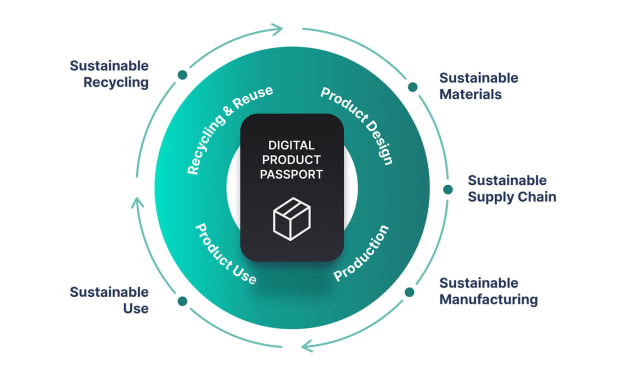Greenwashing: What is it and why should we avoid it?
Greenwashing

ESG is increasingly in the spotlight of companies and plays an important role in establishing internal and external transformations in organisations. It is necessary to discuss not only the fundamental pillars involving environmental, social and governance issues but also other practices that permeate this discourse, including the term "greenwashing ".
Therefore, knowing and understanding what greenwashing in digital product passport means and what its consequences are is what can determine the success or failure of a company's ESG actions.
Being sustainable means looking at the world around us with more responsibility and concern for the way we consume. In this regard, it has never been more urgent to talk about measures to reduce the harmful effects and negative impacts that companies end up leaving on the environment. As a result, consumers are more aware of these issues and are looking for companies and brands that adopt more sustainable practices.
But not everything is as it seems and there are many misconceptions and errors in this area. Greenwashing and how your company can avoid this practice.
What is greenwashing?
A term that can be translated as "green lie", "greenwashing" or even "green makeup".
The term refers to the misleading behavior of brands that attribute their practices to sustainable issues and concern for the environment, but in reality, have no real commitment to this issue. These are speeches and advertisements that aim to convey a misleading message of adopting ecologically correct practices.
To achieve this, companies carry out actions and communication strategies that make their consumers, partners and employees believe that they really work in favour of sustainability, but without implementing these measures in practice. As the ESG agenda is on the rise, some private and public companies, industries and organisations have seen the perfect opportunity to take advantage of the current practice, without actually implementing it. This makes things even more dangerous, given the serious damage and lawsuits that this type of behaviour can lead to.
Main examples of greenwashing
Those who practice greenwashing know how important and influential the media and advertising are in reinforcing this false idea of a sustainable company, so they focus primarily on uninformative discourse, with labels and packaging that can be misleading.
To better understand and recognize this practice, we have gathered some important examples:
Follow us
Claims without evidence: A good example of this is when cosmetics packaging is labelled as “vegan” to sell an image that they are potentially sustainable and animal-friendly. However, in practice there is nothing to back up this claim and they continue to use animal testing.
A classic is the promotion of "consuming less water", which conveys the idea of being respectful of the environment but pays no attention to other more serious issues such as reducing the use of plastic, for example.
Vague information is when a company communicates something in an imprecise manner, leaving its customers and consumers with doubts about what it really means or without providing any data to support its claim. Examples of this are vague expressions such as "sustainable", "environmentally friendly" and the famous "eco-friendly".
There are many other good examples of situations where brands use misleading advertising to promote a sustainable discourse. And very famous cases of "greenwashing" that need to be discussed so that they can really be abolished from the market.
Famous cases of greenwashing
As we have already mentioned, there are many examples of greenwashing practices in the market and some are quite famous, precisely because they involve giant brands and companies.
Nestlé
What happened to the world's largest packaged food company is a good example of how some companies can stumble on the measures they should take in terms of good ESG practices and simply "dress up" their products to make them appear sustainable.
In 2008, Nestlé launched a bottled water with the slogan: "bottled water is the most environmentally friendly product in the world." Needless to say, the brand was widely denounced for this slogan and had to go public in order to retract it. Nestlé currently wants all its packaging to be recyclable or reusable by 2025. There is an effective action plan to address the ESG pillars with more responsibility and commitment.
How to avoid "greenwashing"
As a responsible company that really wants to reduce the negative impacts it leaves on the environment, the ideal way to avoid the greenwashing phenomenon is to set clear and assertive ESG goals and objectives for everyone in the company.
Investors must be clear about these processes and understand the company's attitudes and actions to fit into the ESG culture. Once these points are aligned with practice, it is time to transmit and disseminate communication committed to the truth and responsible for explaining every detail. Precisely because we know that there is still no way to be 100% sustainable, but there is a way to commit to further reducing negative results with ecologically efficient waste management.
How should your company position itself against “greenwashing”?
To avoid the practice of greenwashing, your company must have as a basic principle a direct, clear and transparent relationship with its employees, investors, partners and customers. Promote a commitment to real objectives that can be measured and demonstrated, pointing out environmental certifications and proving the information disclosed.
Think about how your company should position itself in the market to avoid greenwashing and digital product passport resource truly follow the pillars established by ESG.
It is essential to understand how the company wants to be seen and recognized by its market niche, understanding that the greatest allies to gain credibility and authority are consumers, so they must be treated with honesty and respect at all times.
About the Creator
Transgenie
Our Delivery Management Software is the ultimate solution for businesses looking to optimize their delivery operations.
https://www.transgenie.io
Enjoyed the story? Support the Creator.
Subscribe for free to receive all their stories in your feed.






Comments
There are no comments for this story
Be the first to respond and start the conversation.